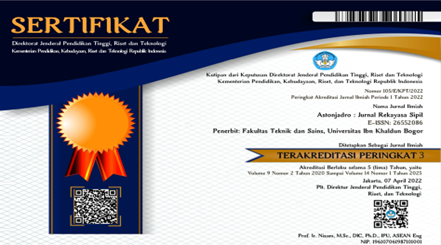Barriers to Electric Car Acceptance: Analysis of Consumer Perceptions Regarding Safety and Security
DOI:
https://doi.org/10.32832/astonjadro.v12i2.8953Keywords:
electric vehicles, electric cars, batteries, safety, security.Abstract
The Indonesian government has issued Presidential Regulation Number 55 of 2019 concerning the acceleration of the battery-based electric motorized vehicle program. In 2019 the sales data for PHEV were 25 units and HEV was 787 units, sales of new BEV battery-based cars were recorded in 2020 totaling 125 units, PHEV and HEV were sold 8 and 1,191 units. For 2021 sales of BEV were 687 units, PHEV 46 units and HEV 2,472 units and until March 2022, BEV sales were 64 units, PHEV 10 units and HEV 646 units. It can be seen from the above data that sales growth has occurred, but it is still quite low compared to fossil fuel cars (a percentage of no more than 0.5% each year). Seeing the number that is still minimal, it is necessary to look at the obstacles that occur in the community, why this can happen, even though the Indonesian government wants to build an integrated electric vehicle ecosystem to encourage energy security and domestic energy independence so as to reduce dependence on the use of fuel oil and reduce greenhouse gas emissions. One of these obstacles is the aspect of safety and security. The survey was conducted throughout the provinces of Indonesia with the results that the most perceived obstacles from the aspect of safety and security were batteries, very minimal sound noise, geographical and weather conditions in Indonesia and the risk of hacking, ransomware and other forms of cyber attacks due to sophisticated technology. attached to an electric car. Another result that is in the spotlight is that there are still many respondents who answered they did not know about electric cars,
References
Berkeley, N., Jarvis, D., Jones, A., 2018. Analyzing the take up of battery electric vehicles: an investigation of barriers amongst drivers in the UK. Transport. Res. Transport Environment. 63, 466–481.https://doi.org/10.1016/trd.2018.06.016.
Biresselioglu, ME, Kaplan, MD, Yilmaz, BK, 2018. Electric mobility in Europe: a comprehensive review of motivators and barriers in decision making processes. Transport. Res. Pol. Pract. 109, 1–13.https://doi.org/10.1016/j.tra.2018.01.017.
Danielis, R., Giansoldati, M., Rotaris, L., 2018. A probabilistic total cost of ownership model to evaluate the current and future prospects of electric cars uptake in Italy. Energy Pol. 119, 268–281.https://doi.org/10.1016/j.enpol.2018.04.024.
Danielis, R., Rotaris, L., Giansoldati, M., Scorrano, M., 2020a. Drivers' preferences for electric cars in Italy. Evidence from a country with limited but growing electric car uptake. Transport. Res. Pol. Pract. 137, 79–94.https://doi.org/10.1016/j. tra. 2020.04.004.
Danielis, R., Giansoldati, M., Scorrano, M., 2020b. Policy measures to promote electric vehicles: are they effective and efficient? Science Reg. 19(1), 159–168.https://doi.org/10.14650/95932
Egbue, O., Long, S., 2012. Barriers to widespread adoption of electric vehicles: an analysis of consumer attitudes and perceptions. Energy Pol. 48, 717–729.https://doi.org/10.1016/j.enpol.2012.06.009.
ED Kostopoulos, GC Spyropoulos, JK Kaldellis, Real-world study for the optimal charging of electric vehicles, Energy Rep. 6 (2020) 418–426,https://doi.org/10.1016/j.egyr.2019.12.008.
Giansoldati, M., Danielis, R., Rotaris, L., Scorrano, M., 2018. The role of driving range in consumers' purchasing decision for electric cars in Italy. Energy 165, 267–274.https://doi.org/10.1016/j.energy.2018.09.095.
Graham-Rowe, E., Gardner, B., Abraham, C., Skippon , S., Dittmar, H., Hutchins, R., Stannard, J., 2012. Mainstream consumers driving plug-in battery-electric and plug -in hybrid electric cars: a qualitative analysis of responses and evaluations. Transport. Res . Pol. practice . 46(1), 140–153.https://doi.org/10.1016/j.tra.2011.09.008.
Haustein, S., Jensen, AF, 2018. Factors of electric vehicle adoption: a comparison of conventional and electric car users based on an extended theory of planned behavior. int. J. Sustain. transp. 12(7), 484–496.https://doi.org/10.1080/15568318.2017.1398790.
L. Rotaris, M. Giansoldati, M. Scorrano, The slow uptake of electric cars in Italy and Slovenia. Evidence from a stated-preference survey and the role of knowledge and environmental awareness, Transp. Res. Part A Policy Practice. 144 (2021) 1–18,https://doi.org/10.1016/j.tra.2020.11.011.
Milad Ghasri, Ali Ardeshiri, Taha Rashidi., 2019. Perception towards electric vehicles and the impact on consumers' preferences. Transportation Research Part D 77, 271-291. https://doi.org/10.1016/j.trd.2019.11.003
Noel, L., de Rubens, GZ, Kester, J., Sovacool, BK, 2020. Understanding the socio-technical nexus of Nordic electric vehicle (EV) barriers: a qualitative discussion of range, price, charging and knowledge. Energy Pol. 138, 111292.https://doi.org/10.1016/j.enpol.2020.111292.
N. Wang, L. Tang, H. Pan, A global comparison and assessment of incentive policy on electric vehicle promotion, Sustain. Cities Soc. 44 (2019) 597–603,https://doi.org/10.1016/j.scs.2018.10.024.
Patt, A., Aplyn, D., Weyrich, P., van Vliet, O., 2019. Availability of private charging infrastructure influences readiness to buy electric cars. Transport. Res. Pol. Pract. 125, 1–7.https://doi.org/10.1016/j.tra.2019.05.004.
Peter Cocron, Josef F. Krems, 2013. Driver perceptions of the safety implications of quiet electric vehicles. Accident Analysis and Prevention 58 (2013) 122–131.Department of Psychology, Chemnitz University of Technology, Chemnitz, Germany
She, ZY, Sun, Q., Ma, JJ, Xie, BC, 2017. What are the barriers to widespread adoption of battery electric vehicles? A survey of public perception in Tianjin, China. Transp. Policy 56, 29–40.https://doi.org/10.1016/j.tranpol.2017.03.001.
Scorrano, M., Giansoldati, M., Danielis, R., 2019. The cost gap between electric and petrol cars. An estimate via a persona-based deterministic and a probabilistic total cost of ownership model. int. J. Transp. Econ. XLVI, 93–122.https://doi.org/10.19272/201906703005.
Scorrano, M., Danielis, R., Giansoldati, M., 2020a. Dissecting the total cost of ownership of fully electric cars in Italy: the impact of annual distance traveled, home charging and urban driving. Res. Transport. Econ. 80, 100799.https://doi.org/10.1016/j.retrec.2019.100799.
Zaunbrecher, BS, Beul-Leusmann, S., Ziefle, M., 2014. Laypeople's perspectives on electromobility: a focus group study. In: Int. Internet of Things Summit, pp. 144–149.
https://www.otosia.com/NEWS/List-mobil-listrik-di-indonesia-dari-termurah-to-termahal.html
Zaunbrecher, BS, Beul-Leusmann, S., Ziefle, M., 2014. Laypeople's perspectives on electromobility: a focus group study. In: Int. Internet of Things Summit, pp. 144–149.
https://www.otosia.com/NEWS/List-mobil-listrik-di-indonesia-dari-termurah-to-termahal.html
Downloads
Published
How to Cite
Issue
Section
License
Copyright (c) 2023 ASTONJADRO

This work is licensed under a Creative Commons Attribution-ShareAlike 4.0 International License.
Paper submitted to ASTONJADRO is the sole property of the Astonjadro Journal. Unless the author withdraws the paper because he does not want to be published in this journal. The publication rights are in the journal Astonjadro.ASTONJADRO
LICENSE
This work is licensed under a Creative Commons Attribution-ShareAlike 4.0 International License.
Based on a work at http://ejournal.uika-bogor.ac.id/index.php/ASTONJADRO













